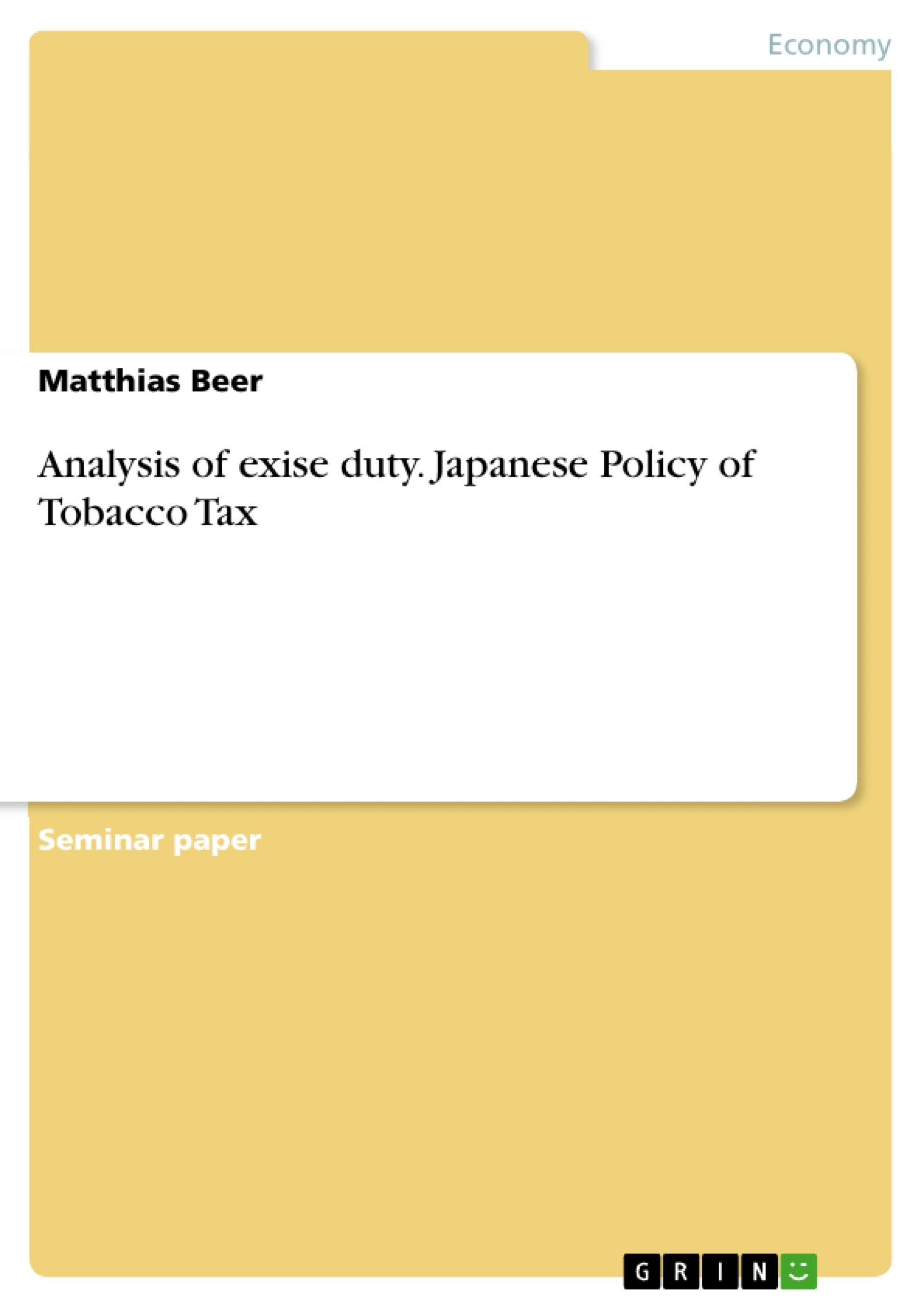Executive Summary:
Governments are trying to motivate people quite smoking with various bans and anti-smoking campaigns but still try to “milk” smokers with tax hikes on tobacco products.
This assignment is describing the Japanese tobacco tax policy which has seen just recently, 1st of October 2010, a major change. As Japan is the only devel-oped country in the top ten smoking statistic, with a male smoking rate of close to 50%, the Japanese Ministry of Health, Labor and Welfare has pushed and driven a 40% tobacco tax hike with the aim of discouraging smokers. Further on, economical aspects on tobacco consumption are analyzed in general and with respect to tobacco tax hikes. The relations are explained on supply and demand curves utilizing given elasticity factors of tobacco demand from the OTC.
Due to the rather inelastic demand of tobacco which is mainly supported by its addictive nature, tax raises will have different effects depending on the age of smokers but mainly depending on social aspects. A tax raise will cause a higher quite rate in developing countries with a low or mid income such as China for instance compared to developed ones like Japan. On the other hand, in devel-oped countries the gain in tax revenue will be higher compared to developing countries.
At the end of the assignment tax strategies aiming for higher tax revenue or aiming for a lower smoking rate are discussed besides general aspects.
Inhaltsverzeichnis (Table of Contents)
- Executive Summary
- List of Abbreviations
- List of Figures
- List of Tables
- List of Equations
- 1. Introduction
- 2. Tobacco Tax policy in Japan.
- 3. Economical Aspects on Tobacco Consumption and Taxation in General
- 3.1. Equilibrium
- 3.2. Elasticity
- 3.3. Calculation of revenue behavior versus taxation
- 4. Tobacco Tax Strategies
- 4.1. General aspects
- 4.2. Increase of tax revenue
- 4.3. Discourage smoking
- 5. Personal View
- 6. ITM Checklist
- Bibliography
Zielsetzung und Themenschwerpunkte (Objectives and Key Themes)
This assignment analyzes the Japanese tobacco tax policy, focusing on the recent 40% tax hike implemented in October 2010. The assignment aims to explore the economic impacts of this policy, including its effects on consumption, revenue, and smoking rates, both in Japan and internationally.- The impact of tobacco tax hikes on smoking rates and consumption.
- The role of elasticity in determining the effectiveness of tobacco tax policies.
- The economic implications of tobacco taxation, including revenue generation and its impact on government finances.
- The social and economic factors influencing the effectiveness of tobacco tax policies in different countries.
- The various strategies employed by governments to influence smoking rates through taxation.
Zusammenfassung der Kapitel (Chapter Summaries)
- Introduction: This section provides an overview of the assignment's focus, highlighting the recent tobacco tax hike in Japan and its potential economic implications.
- Tobacco Tax policy in Japan: This chapter delves into the specifics of Japan's tobacco tax policy, including the recent tax hike and its intended impact on smoking rates. It also discusses the context of Japan's high smoking rates and the motivations behind the policy change.
- Economical Aspects on Tobacco Consumption and Taxation in General: This chapter explores the broader economic aspects of tobacco consumption and taxation. It examines the equilibrium price and quantity in the tobacco market, the role of elasticity, and how revenue changes in response to tax increases.
- Tobacco Tax Strategies: This section investigates various tobacco tax strategies employed by governments, considering both the objective of increasing revenue and the goal of discouraging smoking. It discusses general considerations and specific strategies implemented in different contexts.
Schlüsselwörter (Keywords)
This assignment focuses on the economic analysis of tobacco taxation, particularly in the context of Japan's recent tax hike. Key terms include tobacco consumption, tobacco tax policies, elasticity, revenue generation, smoking rates, and government strategies. The assignment explores the complex relationship between tobacco taxation and its impacts on consumption, revenue, and social welfare.Frequently Asked Questions
Why did the Japanese government implement a major tobacco tax hike in 2010?
The primary goal was to discourage smoking, as Japan had very high smoking rates (nearly 50% among men). Additionally, the government aimed to increase tax revenue.
How does the elasticity of demand affect tobacco taxation?
Tobacco demand is generally inelastic because of its addictive nature. This means that price increases through taxes lead to a less than proportional drop in consumption, often resulting in higher total tax revenue.
Do tobacco tax hikes work differently in developed vs. developing countries?
Yes. In developing countries with lower incomes (like China), tax raises often lead to a higher rate of people quitting. In developed countries like Japan, the gain in tax revenue tends to be higher because smokers are more likely to continue buying despite price increases.
What are the main strategies of tobacco taxation?
Governments usually pursue two strategies: either maximizing fiscal revenue or focusing on public health by setting taxes high enough to significantly reduce smoking rates.
What is the role of the Japanese Ministry of Health in this policy?
The Ministry of Health, Labor and Welfare was the main driver behind the 40% tax hike, viewing it as a crucial tool for public health and smoking prevention.
- Citation du texte
- Dipl. Ing. MBA Matthias Beer (Auteur), 2011, Analysis of exise duty. Japanese Policy of Tobacco Tax, Munich, GRIN Verlag, https://www.grin.com/document/233252



